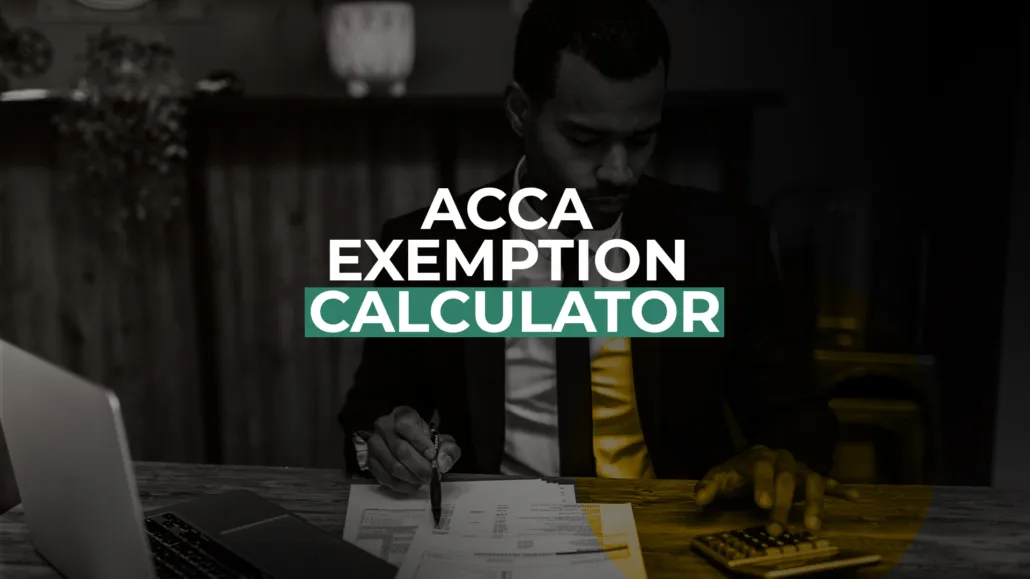
Wouldn’t it be great to skip some exams and reach the position you desire in the field of accountancy?
Well, ACCA exemptions provide you with this opportunity and start studies at a level that is consistent with your current knowledge and skills.
Thereby shortening your process and journey to acquire ACCA membership.
The process and procedure followed by ACAA are extremely strict as the organisation needs to ensure that only qualified candidates are given the exemption.
In this article, we will know about the ACCA exemption calculator and how students are awarded exemptions, when they should apply, and what courses they can take to apply for the exemptions.
Get to know more about ACCA Syllabus
In What Conditions an Exemption is Awarded at ACCA?
The ACCA exemptions are awarded subject to the fulfilment of some conditions. These pertain to the applicant’s qualifications only.
- No exemptions are awarded based on the person’s work experience.
- In terms of qualifications, the exemptions are awarded on the basis of the education that contains relevant content. This content must relate to the Applied Knowledge and Applied Skills levels of ACCA qualifications.
ACCA awards exemptions to students based on;
- Certificate and diploma courses (but only from recognised institutions)
- Foundational degrees
- Bachelor or undergraduate degree
- Postgraduate degree
- Professional qualification
Eager to know which ACCA exemptions you are eligible for?
ACCA Exemption Calculator | Courses giving Students the Benefit of Exemption
The following table shows the degree course you might have done or will do along with some recognised universities and colleges by the ACCA.
| Degree or Course | *Institution (College or University) | Exemptions | ||
| Level 1 | Level 2 | Level 3 | ||
| B.Com | Ahmedabad University | F1 – Business and Technology (BT) F2 – Management Accounting (MA) F3 – Financial Accounting (FA) | F1 – Business and Technology (BT) F2 – Management Accounting (MA) F3 – Financial Accounting (FA) F4 – Corporate and Business Law (LW) | F1 – Business and Technology (BT) F2 – Management Accounting (MA) F3 – Financial Accounting (FA) F4 – Corporate and Business Law (LW) |
| M.Com | Bangalore Central University | F1 – Business and Technology (BT) | F1 – Business and Technology (BT) F2 – Management Accounting (MA) F3 – Financial Accounting (FA) | F1 – Business and Technology (BT) F2 – Management Accounting (MA) F3 – Financial Accounting (FA) |
| BBA | IIS University | F1 – Business and Technology (BT) | F1 – Business and Technology (BT) | F1 – Business and Technology (BT) |
| MBA | Manipal University | N/A | F1 – Business and Technology (BT) F2 – Management Accounting (MA) F3 – Financial Accounting (FA) | F1 – Business and Technology (BT) F2 – Management Accounting (MA) F3 – Financial Accounting (FA) |
| A Degree in Finance | Parul University | F1 – Business and Technology (BT) | F1 – Business and Technology (BT) F2 – Management Accounting (MA) F3 – Financial Accounting (FA | F1 – Business and Technology (BT) F2 – Management Accounting (MA) F3 – Financial Accounting (FA |
| A Degree in Law | The National College, Bangalore | No Exemptions | F4 – Corporate and Business Law (LW) | F4 – Corporate and Business Law (LW) |
*Universities mentioned above are meant for understanding. Please check the full list below.
These are the degree courses and programs you can choose to get ACCA exemptions. ACCA has provided the *list of colleges and universities recognised, and students from the selected institutions can only apply for the exemptions.
The three levels of ACCA exemptions are connected to the year of the course. Level 1 means students in Year 1, Level 2 is for students in Year 2, and the same applies to Level 3.
Besides the degree programs, the students can also apply for ACCA exams and exemptions on the basis of their achievements. This pertains to the passing of different accounting-related exams.
Find these exams and the exemptions they provide in the table below;
| CA IPCC | Examination | F1 – Business and Technology (BT) F2 – Management Accounting (MA) F3 – Financial Accounting (FA) F6 – Taxation (TX) F8 – Audit and Assurance (AA) |
| Qualified Chartered Accountants | Examination | F1 – Business and Technology (BT) F2 – Management Accounting (MA) F3 – Financial Accounting (FA) F4 – Corporate and Business Law (LW) F5 – Performance Management (PM) F6 – Taxation (TX) F7 – Financial Reporting (FR) F8 – Audit and Assurance (AA) F9 – Financial Management (FM) |
| Chartered Accountant Inter Qualified | Examination | F1 – Business and Technology (BT) F2 – Management Accounting (MA) F3 – Financial Accounting (FA) F6 – Taxation (TX) F8 – Audit and Assurance (AA) |
| Chartered Accountant Inter Pursuing | Examination | F1 – Business and Technology (BT) F2 – Management Accounting (MA) F3 – Financial Accounting (FA) F6 – Taxation (TX) |
Out of all the benefits according to the ACCA exemption calculator, the qualified CAs stand to gain the most among all the students. CA’s are exempted from nine test areas from both the areas; Applied Knowledge and Applied Skills.
However, no qualification and examination make a student eligible for exemption in Strategic Professional – Essentials and Strategic Professional – Options categories. The specific areas under these components are;
- Strategic Professional – Essential
- Strategic Business Leader – SBL
- Strategic Business Reporting – SBR
- Strategic Professional – Options
- Advanced Financial Management – AFM
- Advanced Performance Management – APM
- Advanced Taxation – ATA
- Advanced Audit and Assurance – AAA
While applying for the exemption, make sure to use the ACCA exemption calculator available on the official website. The calculator will help you know whether your degree or institution is included in the list of qualified exemptions.
What’s the Process to Claim Exemption in ACCA?
The most common way to apply for the exemption is by sending an email with the required information and documents at info@accaglobal.com. Note that you must become a student with ACCA and also pay the exemption fee to avail of the benefits.
However, it is possible to check for the ACCA exemptions applicable in your case before you can become a student at ACCA. Here’s the process for the same;
- Documents: You need to submit your course details, including the course name, scores achieved, and the name of the institution.
All the documents must be signed and stamped by the institution. Besides the mark sheets, you must also submit the degree certificate showing data of completion and the years completed in the course.
- Send the Email: Attach all the documents in the email in JPEG or PDF format. No document shall have a size of more than 5 MB.
- Confirmation: Within 48 hours of sending the email, you will receive a confirmation from ACCA. You will be notified of the acceptance and forwarding of the documents to the relevant team for further assessment. Or the email will be about the submission of further documents.
It can take, on average, 10 days time to assess the documents. But in some cases, the number of days can be more.
- Exemption Notification: Subject to the final answer, you will get the requisite email notifying you about the eligible ACCA exemptions. Further, you will be asked to become an ACCA student and also pay the exemption fee.
When Should a Student Apply for the ACCA Exemptions?
Ideally, you must apply for the exemptions after becoming an ACCA student. But for confirmation purposes, you can follow the instructions shared above to check the eligibility and become a student.
Irrespective of whether you want to become a student before or after, you can apply for the exemption at any time. Between becoming a student and applying for the exemptions, you have gained more certificates, you can reapply, and your application will be reassessed.
Conclusion
ACCA exemptions help students fast track the process to get accredited by the ACCA. The members and students of this global organisation can explore better opportunities leading to effective personal and professional development. Getting exemptions can help you fast track the process to get recognition from a globally identified organisation.
Students looking to build a career in Accounting and Finance stand to gain the most from ACCA accreditation and hence must apply for the exemptions whenever they get a chance. IMS proschool understands the importance of getting into ACCA and provides a dedicated course to help students prepare for the same while helping them understand the nuances of exemptions and exams.







Leave A Comment